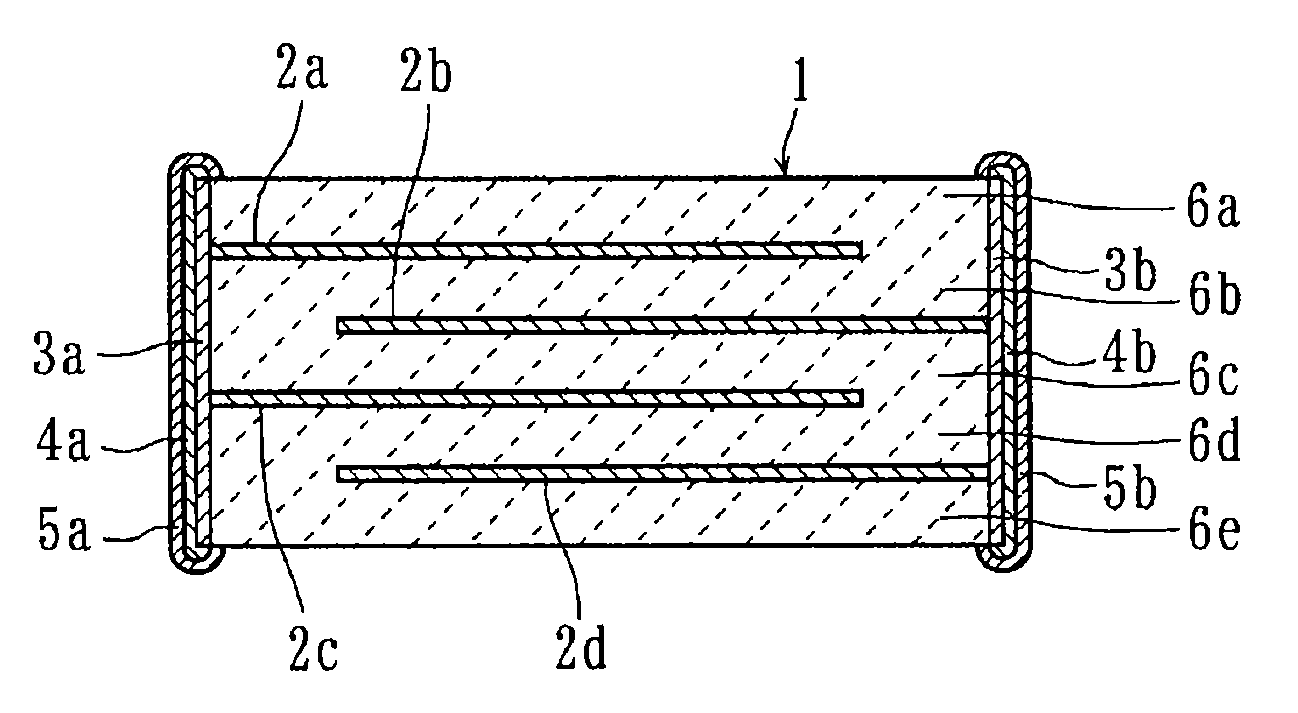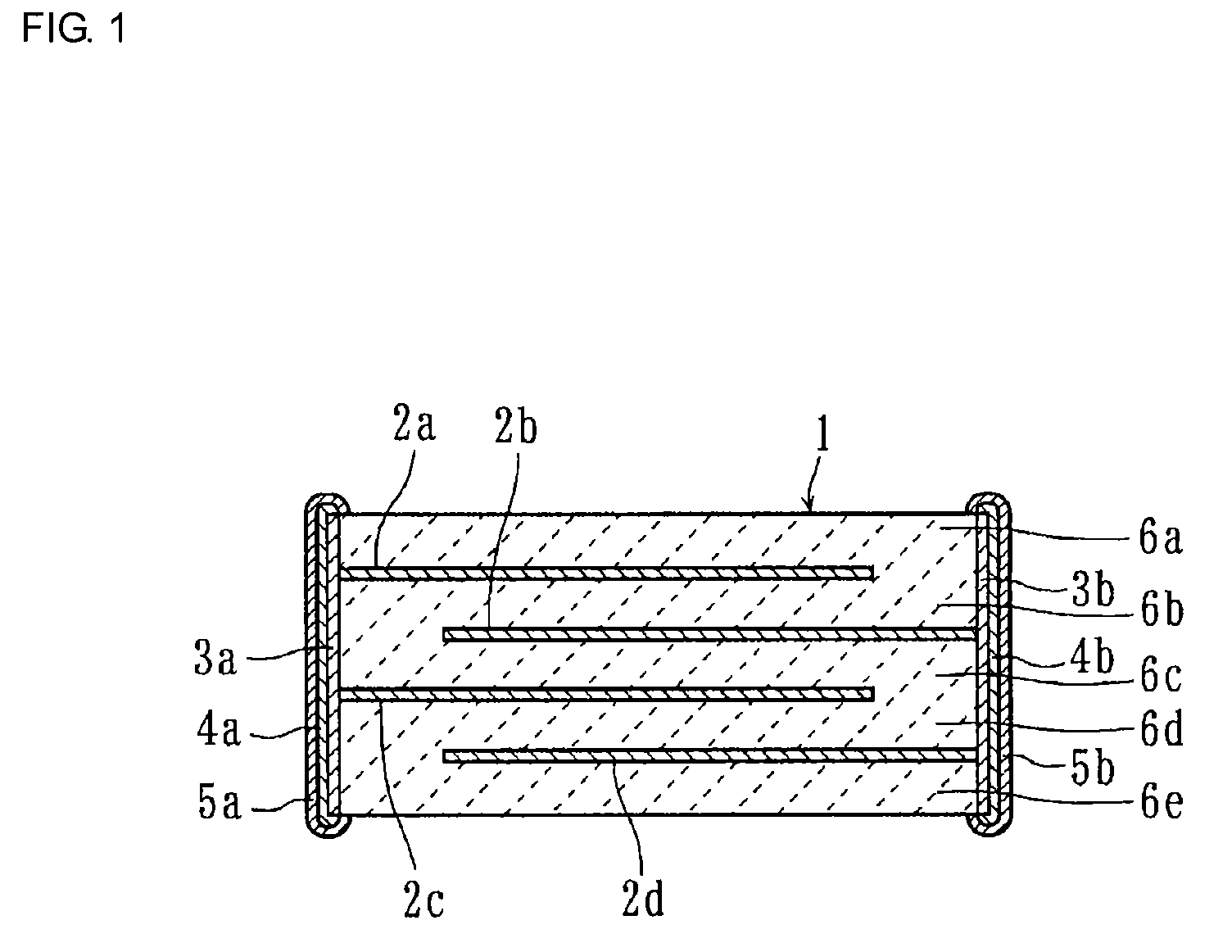Dielectric ceramic, ceramic electronic element, and multilayer ceramic capacitor
a technology of electronic elements and capacitors, applied in the field of dielectric ceramics, can solve problems such as varied problems, and achieve the effects of improving sintering properties, stably using, and easy modification of dielectric properties
- Summary
- Abstract
- Description
- Claims
- Application Information
AI Technical Summary
Benefits of technology
Problems solved by technology
Method used
Image
Examples
example 1
[0084]First, as ceramic raw materials, BaCO3, TiO2, CaCo3, and SnO2 were prepared. Next, these ceramic raw materials were weighed so that primary components had the compositions as shown in Table 1. Subsequently, the materials thus weighed were charged to a ball mill with PSZ balls and pure water and were sufficiently mixed and pulverized by a wet process, followed by drying, so that a mixed powder was obtained.
[0085]Next, after this mixed powder was calcined by a thermal treatment performed at a temperature of 1,000° C. for 2 hours in a reducing atmosphere containing a N2—H2 mixed gas in which the oxygen partial pressure was controlled to be 1.0×10−10.0 MPa, dry pulverization was performed, so that a powdered ceramic starting material having a primary composition represented by (Ba1-x-yCaxSny)mTiO3 was formed.
[0086]Next, after a poly(vinyl butyral)-based binder and ethanol functioning as a solvent were added to this powdered ceramic starting material, mixing and pulverizing were pe...
example 2
[0101]As ceramic raw materials, BaCO3, TiO2, CaCO3, and SnO2 were prepared as in the example 1. Next, these ceramic raw materials were weighed so that primary components had the compositions as shown in Table 2. Subsequently, the materials thus weighed were charged to a ball mill with PSZ balls and pure water and were sufficiently mixed and pulverized by a wet process, followed by drying, so that a mixed powder was obtained.
[0102]Next, this mixed powder was calcined by a thermal treatment performed at a temperature of 1,000° C. for 2 hours in a reducing atmosphere containing a N2—H2 mixed gas in which the oxygen partial pressure was controlled as shown in Table 2, and dry pulverization was then performed, so that a powdered ceramic starting material having a primary composition represented by (Ba1-x-yCaxSny)mTiO3 was formed.
[0103]Next, after an acrylic-based organic binder and ethanol functioning as a solvent were added to this powdered ceramic starting material, wet mixing was perf...
example 3
[0117]By a method and a procedure similar to those of the example 1, multilayer ceramic capacitors of sample Nos. 21 to 29 were formed so that primary components had the compositions as shown in Table 3. In this example 3, thermal treatments in calcining and firing were each performed at an oxygen partial pressures of 1.0×10−10.0 MPa.
[0118]Next, by methods similar to those of the example 1, the relative dielectric constant εr, the dielectric loss tan δ, and the Curie temperature Tc of each of the sample Nos. 21 to 29 were measured.
[0119]Table 3 shows the composition components of the sample Nos. 21 to 29 and the measurement results thereof.
[0120]
TABLE 3Oxygen partial pressureRelativeDielectric lossCurieSample(Ba1−x−yCaxSny)mTiO3(MPa)dielectrictan δtemperature TcNo.xymIn calciningIn firingconstant εr(%)(° C.)210.080.051.001.0 × 10−10.01.0 × 10−10.01,6003.0152220.100.051.001.0 × 10−10.01.0 × 10−10.01,5003.3150230.150.051.001.0 × 10−10.01.0 × 10−10.01,2003.5153240.200.051.001.0 × 10−10...
PUM
| Property | Measurement | Unit |
|---|---|---|
| dielectric loss tan δ | aaaaa | aaaaa |
| relative dielectric constant εr | aaaaa | aaaaa |
| remanent polarization | aaaaa | aaaaa |
Abstract
Description
Claims
Application Information
 Login to View More
Login to View More - R&D
- Intellectual Property
- Life Sciences
- Materials
- Tech Scout
- Unparalleled Data Quality
- Higher Quality Content
- 60% Fewer Hallucinations
Browse by: Latest US Patents, China's latest patents, Technical Efficacy Thesaurus, Application Domain, Technology Topic, Popular Technical Reports.
© 2025 PatSnap. All rights reserved.Legal|Privacy policy|Modern Slavery Act Transparency Statement|Sitemap|About US| Contact US: help@patsnap.com


